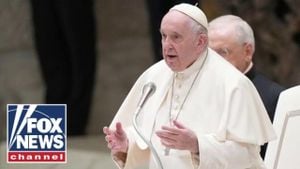The political crisis within Ukraine has intensified as the Verkhovna Rada, the country's parliament, failed on February 24, 2024, to extend the powers of President Volodymyr Zelenskyy. This significant event sparked discussions about the country's democratic integrity amid the continuing Russian aggression.
During the session, the parliament was called to vote on a resolution supporting democracy and the necessity of maintaining Zelenskyy’s leadership until new elections could be conducted. This resolution, titled "On Supporting Democracy in Ukraine Under Conditions of Russian Aggression," received only 218 votes from the required 226, highlighting significant division among parliament members.
Yaroslav Zheleznyak, who reported the outcome, declared on his Telegram channel, "The resolution of the Verkhovna Rada to support democracy in Ukraine failed." The proposed measure was intended to underline the importance of Zelenskyy continuing his duties until the presidential elections, which can only take place once military hostilities have abated.
The resolution also emphasized the upholding of the Ukrainian constitution, stating, “The law requires the continuation of the duties of the President until the newly elected one takes office.” Despite the failed voting, parliament acknowledged shared sentiments about the democratic process, asserting the need for free and fair elections post-war.
Alexey Goncharenko, another deputy, stressed the significance of this situation, stating, “Zelensky should execute his powers as stipulated by the constitution until the election of the new president.” This remark sheds light on the expectations from the Ukrainian government to uphold democratic principles even during turbulent times.
There was also international scrutiny surrounding the vote, as European observers were present during the session. This adds another layer of complexity, showcasing the global interest in Ukraine’s political stability. Alexander Dubinsky, speaking to reporters, criticized the parliament's decision, referring to it as "a slap to the face of democracy," and remarked, "Ukraine cannot afford leaders with expired terms seeking external guarantees instead of building internal strength.”
International reactions from leaders like Russian President Vladimir Putin and former U.S. President Donald Trump highlighted the precarious position Zelenskyy finds himself. Putin claimed, "Zelensky’s legitimacy has expired," indicating Russia's perspective on the leadership question. Trump also urged Ukraine to conduct elections, stating, "If Ukraine wants to be part of negotiations, it must hold elections," casting Zelenskyy as undemocratic for not pursuing this course of action.
Zelenskyy, on his part, maintained his commitment to Ukraine's democratic processes during his press conferences, stating he is ready to leave office for the sake of peace, indicating the delicate balance he attempts to maintain between governmental stability and public trust. "I won’t be at the helm for decades, but we need to clarify the situation and build upon the trust of the citizens," he asserted.
The recent developments clearly place Zelenskyy under scrutiny not only internally but also from global audiences. The pressure mounts for him to navigate this turbulent political climate—he must balance national governance against external perceptions and the war-torn backdrop of the country.
Discussions about organizing elections arise as statements begin to echo on constitutional requirements for free elections after the cessation of hostilities. The Central Electoral Commission's chairman had previously commented on the feasibility of elections, highlighting the need for the war to conclude and military laws to be lifted. This insists on the view shared by many parties within the parliament, reflecting unity on the fundamental necessity for the Ukrainian populace to choose their representatives under fair conditions.
Both the Verkhovna Rada and Zelenskyy acknowledge the limitations placed on them by the war. The parliament's assertion—that free, transparent elections can't occur under military rule—echoes sentiments throughout Ukraine and among international democratic observers. This adds complexity to the narrative of legitimacy for the current administration amid external pressures.
The coming days will be pivotal as the Ukrainian leadership navigates through diplomatic channels and military engagements, aiming for stability and the restoration of democratic processes. The failed attempt to extend Zelenskyy's powers highlights the urgent need for external and internal dialogues to reach consensus on how to proceed post-conflict.
Ukraine stands at a crossroad, challenged by the realities of war yet sought after for democratic governance. The ability to organize elections post-conflict—free from military oversight—is now more than just constitutional but has become imperative for national healing and future legitimacy.



